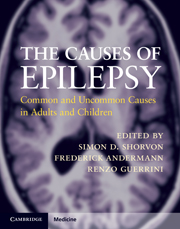Book contents
- The Causes of Epilepsy
- The Causes of Epilepsy
- Copyright page
- Contents
- Contributors
- Foreword
- Preface – an act of supererogation?
- Section 1 Introduction
- Section 2 Idiopathic epilepsy
- Section 3 Symptomatic epilepsy
- Section 4 Provoked epilepsies
- Chapter 88 Introduction to the concept of provoked epilepsy
- Chapter 89 Fever
- Chapter 90 The menstrual cycle and catamenial epilepsy
- Chapter 91 Sleep
- Chapter 92 Metabolic and endocrine-induced seizures
- Chapter 93 Electrolyte and sugar disturbances
- Chapter 94 Drug-induced seizures
- Chapter 95 Alcohol- and toxin-induced seizures
- Chapter 96 How reflex mechanisms cause epilepsy
- Chapter 97 Visual stimuli, photosensitivity, and photosensitive epilepsy
- Chapter 98 Startle-induced (and other sensory-induced) epilepsy
- Chapter 99 Primary reading epilepsy
- Chapter 100 Auditory-induced epilepsy
- Chapter 101 Focal reflex seizures – with emphasis on seizures triggered by eating
- Chapter 102 Hot-water epilepsy
- Chapter 103 Reflex epilepsy with higher-level processing
- Section 5 Status epilepticus
- Index
- Plate Section
Chapter 102 - Hot-water epilepsy
from Section 4 - Provoked epilepsies
Published online by Cambridge University Press: 05 March 2012
- The Causes of Epilepsy
- The Causes of Epilepsy
- Copyright page
- Contents
- Contributors
- Foreword
- Preface – an act of supererogation?
- Section 1 Introduction
- Section 2 Idiopathic epilepsy
- Section 3 Symptomatic epilepsy
- Section 4 Provoked epilepsies
- Chapter 88 Introduction to the concept of provoked epilepsy
- Chapter 89 Fever
- Chapter 90 The menstrual cycle and catamenial epilepsy
- Chapter 91 Sleep
- Chapter 92 Metabolic and endocrine-induced seizures
- Chapter 93 Electrolyte and sugar disturbances
- Chapter 94 Drug-induced seizures
- Chapter 95 Alcohol- and toxin-induced seizures
- Chapter 96 How reflex mechanisms cause epilepsy
- Chapter 97 Visual stimuli, photosensitivity, and photosensitive epilepsy
- Chapter 98 Startle-induced (and other sensory-induced) epilepsy
- Chapter 99 Primary reading epilepsy
- Chapter 100 Auditory-induced epilepsy
- Chapter 101 Focal reflex seizures – with emphasis on seizures triggered by eating
- Chapter 102 Hot-water epilepsy
- Chapter 103 Reflex epilepsy with higher-level processing
- Section 5 Status epilepticus
- Index
- Plate Section
Summary
Keywords
- Type
- Chapter
- Information
- The Causes of EpilepsyCommon and Uncommon Causes in Adults and Children, pp. 713 - 719Publisher: Cambridge University PressPrint publication year: 2011
- 1
- Cited by

